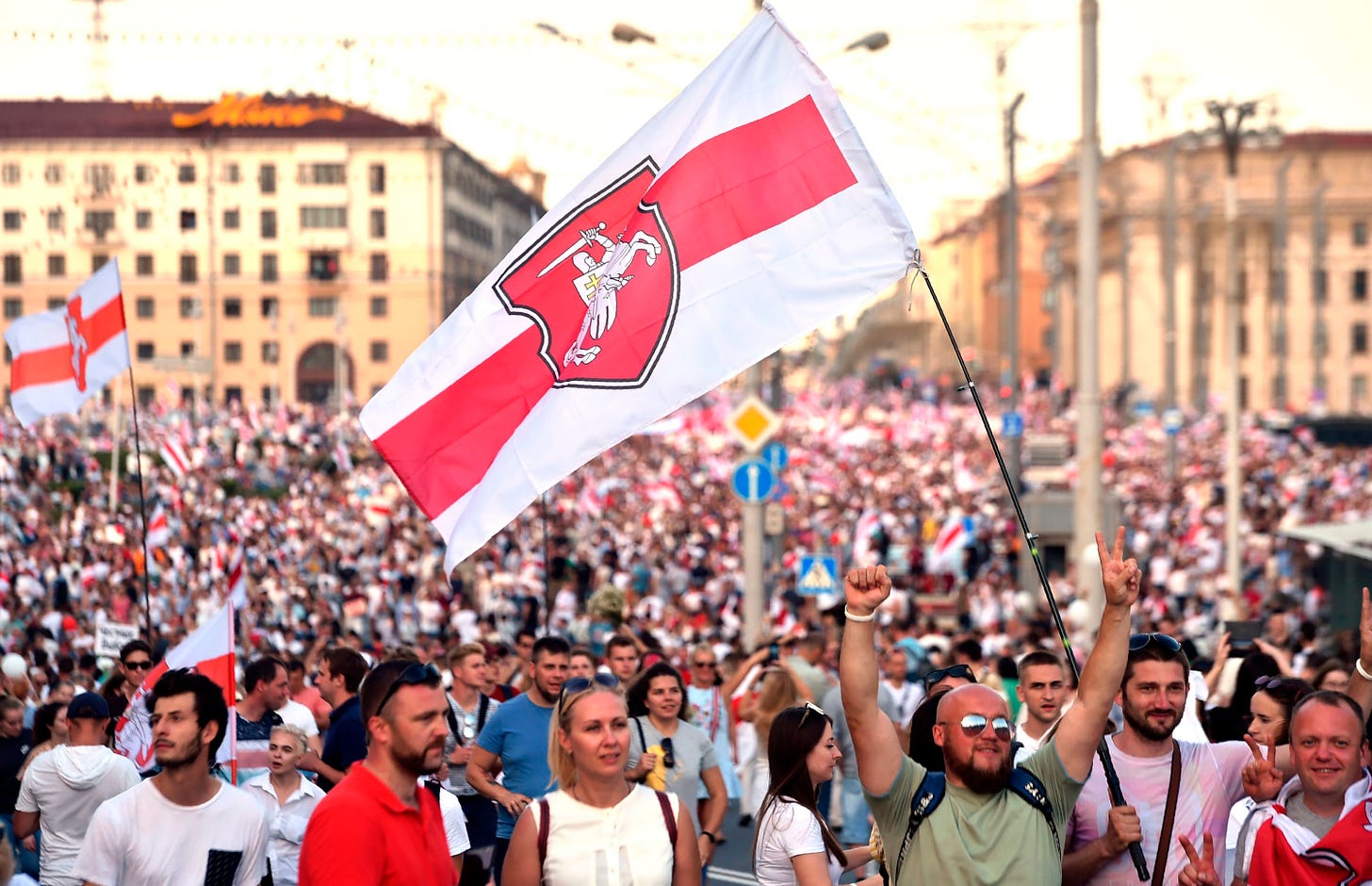Belarus Protests: U.S. and EU Must Act Now
Or else Putin could step in and help destroy or undermine democratic opposition now protesting election fraud.

If the size of protests held across Belarus on Sunday is an indication, Aleksander Lukashenko is hanging by a thread. It would be a massive blow to both the EU and to the transatlantic alliance if Lukashenko’s regime ended up being rescued by a Russian military intervention, as alluded to during the Belarusian strongman’s talks with Vladimir Putin, or by other forms of the Kremlin’s interference.
Unfortunately, there are few signs that that the EU and the United States are rising to the occasion. Yes, governments in Vilnius, Warsaw, and Riga have understood the importance of the moment since the grotesquely rigged presidential election last Sunday, and were soon joined by Sweden, Estonia, and Germany, among others, calling for a concerted EU response. Yet, it took the EU high representative for foreign affairs and security policy, Josep Borrell, several days to issue a vague warning that the EU may “tak[e] measures against those responsible for the observed violence, unjustified arrests, and falsification of election results.” The meeting of the EU’s foreign ministers on Friday did not even produce a joint statement. “Work begins on sanctioning those responsible for violence & falsification,” Borrell tweeted afterwards.
Similarly, the Trump administration does not seem ready to act. Secretary of State Michael Pompeo has sought to warm relations with Belarus, even visiting Minsk this past February. As the protests began following last weekend’s fraudulent election, Pompeo said that “we want the people of Belarus to have the freedoms that they’re demanding.” Beyond that statement, there is no indication that the United States will take action.
But this is not the moment for the EU and the United States to be complacent. When Lukashenko’s regime appeared stable and even maintained a degree of independence from Russia, seeking to topple it was indeed a fool’s errand. But, as of now, Western inaction can only lead to two scenarios, both of them terrible: Either Lukashenko maintains his hold on power with Russian assistance, or the democratic opposition temporarily prevails but will be vulnerable to Russian interference and destabilization.
An even more repressive, Moscow-connected regime on Europe’s doorstep or a weak democracy held in constant jeopardy by the Kremlin’s blackmail would be terrible news for both Europeans and Americans. Western disengagement also provides an opening for China, which has been investing in Belarus at an accelerating pace.
No doubt, Belarus’s transition from authoritarianism is going to be an uphill struggle. In Ukraine, protesters in 2014 fought primarily for Ukraine’s European future and only then against President Viktor Yanukovych. In contrast, ordinary Belarusians are mostly fed up with the quarter-century of Lukashenko’s nostalgic post-Soviet despotism, without seeing a compelling alternative to the country’s geopolitical status quo, in the firm embrace of Putin’s Russia.
If the EU and the United States want to remain relevant in the region, they must not fall back on policy tools that failed to produce results in the past. Broad-based economic sanctions against the country would be particularly counterproductive. Ordinary Belarusians, who would be hit the hardest, did not democratically choose their current leader.
Instead, both the EU and the United States ought immediately to deploy “smart sanctions” freezing the assets of and prohibiting travel for Lukashenko’s inner circle, his political backers, and kleptocrats connected to the regime. The EU discussed targeted sanctions during the meeting on Friday but there is only a short window of opportunity to put such measures in place before the regime cracks down on the protests. That means that both the United States and the EU need to act now, without going through the pointless Kabuki theater at the U.N. Security Council, where China and Russia would block any effort to target the regime.
Most importantly, Belarusians must be able to see a tangible alternative future for their country than that of being an ever-closer ‘Union State’ with Russia. While the appetite for future EU enlargements is nil, there is no reason not to extend visa-free travel to the Schengen Area to a democratic Belarus or to put a Ukraine-style free-trade agreement on the table. There is also no reason not to use the energy infrastructure developed under the auspices of the Three Seas Initiative to alleviate the country’s dependence on Russian oil and gas.
True, there are no guarantees that any Western effort can do the trick—Belarus’s economy and energy sector are tied too closely to Russia, the country has little experience with democracy and only a weak sense of national identity distinct from the legacies of the Soviet era. But not even trying to help a country at Europe’s doorstep shed its authoritarian yoke would be the worst possible signal about the current state of the West and give the revanchist Russia a green light in its efforts to further destabilize the West.



